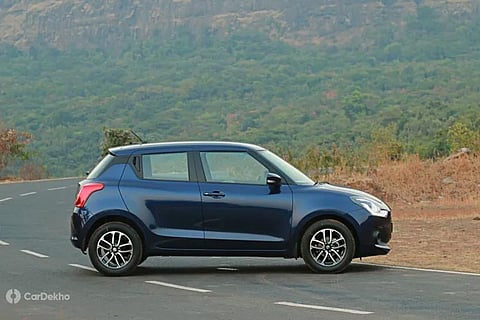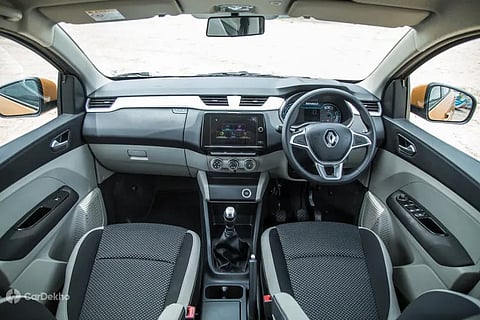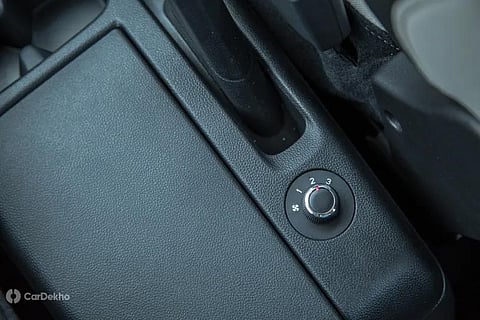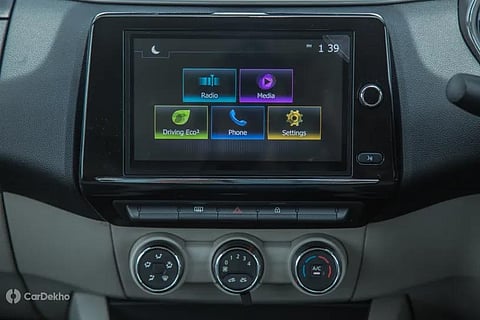The mid-size hatchback segment is about to be intruded upon by the Renault Triber MPV crossover which is scheduled to launch on 28 August. It will be a sub-4m offering with modular seating for upto 7 passengers, and is expected to be priced in the same territory as the Maruti Swift, Hyundai Grand i10 Nios, Ford Figo and Maruti Ignis.
Renault Triber vs Maruti Swift: In Pics
Renault is set to create a new segment with its upcoming compact crossover MPV
While not direct rivals in form and function, the Triber will likely be priced in the same range as the Swift and could be seen as a 5-seater estate option against the compact hatchback. Let’s take a look at how the two cars compare in pictures.
Front
The Renault Triber’s upright stance immediately shows it to be taller and wider than the Swift which is renowned for its driving dynamics, sits lower. It is 113mm taller (without roof rails) than the Swift, which is 1530mm tall while being 4mm wider (not including ORVMs) than the 1735mm wide hatchback.


Both feature very different styling as well and the Triber goes for a more adventurous aesthetic with its wider bumper, skid plate and LED DRLs where the fog lamps would be. Meanwhile the Swift has a sporty look with its bigger front grille and sculpted hood. It also gets auto LED projector headlamps with DRLs on the top-variant seen here.
Side
The Triber measures 3990mm in length, making it 150mm longer than the Swift while having an even longer wheelbase. It is roughly the same size as the bigger Baleno. Its 182mm ground clearance gives it the crossover stance as opposed to the 162mm clearance of the Swift which is sufficient for a city hatchback. The added cladding around the wheel arches also makes Triber look more robust.


Renault’s crossover also gets roof rails, bulge in the roofline and window panes for the third row seats, none of which is offered on the Maruti hatchback. In terms of styling, the Swift has a sporty rear that slopes down while the Triber’s rear end is upright with an almost flat rear end.
Rear
The rugged look of the Triber crossover MPV is most noticeable from its rear end design which gets a contrast black rear bumper with a faux skid plate. It has two-part taillamps that are shaped like an eagle’s beak and wrap around from the side and also onto the tailgate. The number plate is on the tailgate.


Meanwhile the Swift’s rear end features a much larger rear bumper section but it is body coloured and moulded into a sportier shape. Its taillights are smaller in design and do not extend onto the tailgate but unlike the Triber, they do feature LED elements in them.
Interior & Dashboard
The Maruti Swift has an all-black interior as opposed to the Triber’s dual tone cream white and black interior. The Swift’s dash looks sportier and more driver-oriented with the angling of the central console, the flat-bottom steering wheel and the red and white backlighting in the instrument cluster.


The Triber’s dash seems more neutral and spacious, especially with that protruding shelf that has the engine stop-start button. Its cabin also looks airier than the Swift’s cabin. Also, it has rectangular AC vents in the centre while the Swift uses circular vents in the same position.


The Triber also packs a refrigerated storage space in the central console tunnel behind the parking brake, something not offered in the Swift or any mid-size hatchback at the moment.
Infotainment System
Renault has fitted the Triber with an 8-inch touchscreen infotainment system while the Maruti SmartPlay infotainment system in the Swift has a 7-inch touchscreen display. Both offer Android Auto and Apple CarPlay compatibility but have their own interface too.


Climate Control
Both the Triber and Swift have a three dial layout for the AC controls but the Maruti uses the central dial as a display and the entire console feels more upmarket than the Renault. Also, the Swift features auto AC which won’t be offered on the Triber.


Instrument Cluster
The Triber features a 3.5-inch digital LED multi-information display for the speed, odometer and more. It has three virtual gauges with LED indication - tachometer, fuel indicator and engine temperature. The entire setup is quite distinct and looks futuristic.


Meanwhile, the Swift’s instrument cluster also houses a 3.5-inch multi-information display between the two analogue dials for tachometer and speedometer.
Rear Seats
This is where the Renault Triber really shines through with its first-in-segment modular seating. It has a 60:40 split rear bench where the bigger part slides forward while the smaller part can slide and tumble forward to access the removable third row of seats.


The Maruti Swift’s rear bench can also be split fold 60:40 to open up more luggage space. Of course, this hatchback does not have the option for an extra row of seats. It does not offer rear AC vents either.

The Triber has AC vents for the second row on the B-pillars while the third row gets cooling with roof mounted vents. There’s a blower speed control function as well for these vents.
Storage Space
The hatchback has 268 litres of luggage space on offer. Meanwhile, the Triber with its larger proportions has 625 litres of boot space in the 5-seater configuration. However, with the third-row seats in place, it only has 84 litres of luggage space which goes upto 320 litres in the 6-seater layout. With 625 litres, the Triber easily offers the biggest boot space of any sub-4m offering in the country.


Source: cardekho.com